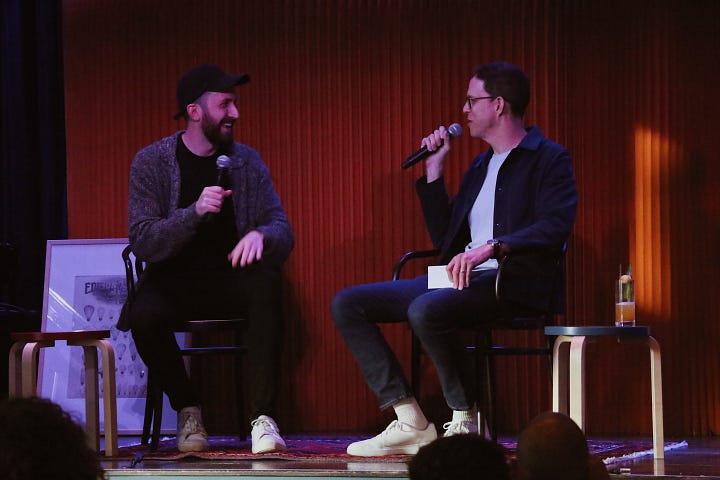Last month during Config, we packed over a hundred designer founders into a jazz club in SF for Designer Founder Night with the Notion team, the first event of its kind. There was something uniquely powerful about gathering designers at every stage of the entrepreneurial journey: those sketching out their first ideas, seasoned founders building their second or third company, and lots of folks in between.
Partnering with Notion was a no-brainer. With a designer founder at the helm (Ivan Zhao) and over 35 former founders on the team, Notion has become one of the most design-forward companies in tech, setting the bar for product quality, craft, and taste.
For the first of two fireside chats (the other with Ivan; recap coming soon) I sat with Brian Lovin. Brian’s journey from Facebook and GitHub to founding Campsite—which was eventually acquired by Notion late last year—is exactly the kind of story we need more of: not a perfectly polished success story, but an honest look at the messy, human side of building something from scratch.
I’m excited to share the recording of our full conversation with you all. You can also keep reading for a written recap + transcript.


Takeaways from the conversation
You have to get good at what you're bad at, sales and tough conversations included
There’s a tendency for designer founders to stick close to what they’re comfortable: designing the product. Brian approached the uncomfortable parts of the job—sales, marketing, firing—as skills he could build with practice.
“I kept reverting to ‘just build the best product.’ If you build it, they will come. That was really challenging for me.”
“I treated it like a video game. I'm bad at all these things, but every cold email is two experience points, every sales call is 20 experience points.”
He also had to grow out of his nice designer identity.
“In design, we're often very nice to each other. I still struggle with giving direct feedback without feeling like an asshole. But when I think about the people I respect most, whose feedback I seek—it's the people who tell me the truth without sugarcoating it.
“A mentor used this phrase with me: ‘What do you want to spend your heartbeats on?’ Our time is limited, but that's also true for people on your team. You don't want other people to waste their heartbeats either. So it's actually kinder to say, as early as possible, ‘We should do something else here.’”
Don’t confuse initial traction with long-term fit
Campsite had many early fans and even sold big contracts. But ultimately not enough end users used it. What excited the buyers (design leaders) didn’t translate to daily behavior.
“We’d sell big contracts…but individual contributors really didn’t like posting work-in-progress to what they saw as a big unknown audience.”
Eventually, Brian and his co-founder realized the product was drifting from what they truly wanted to build.
“At some point, my co-founder Ryan and I looked at each other and asked, ‘Is this what we want to do?’ The answer was increasingly no.”
Use side projects to build conviction before going all in
Brian worked on Campsite for six months on nights and weekends, then took a three-month unpaid leave from GitHub to see if the pull to start was real.
“Start a side project first and work on it for six months…By October, I felt I’d de-risked it enough—I had customers, users, and six months of conviction.”
In 2025, you're up against AI-level outcomes
Founders these days aren’t just pitching incrementally better workflows. Buyers are comparing you to AI solutions promising 2–5x productivity improvements.
“[Your prospect’s] next call is someone saying, ‘I have an AI solution that will replace a department.’ That’s what you’re up against. You're educating people about a new way of working.”
The journey is worth it, even if the end result isn’t what you hoped for
Even if you don’t end up building a unicorn, the personal growth and learning are meaningful on their own.
“Face your fears…the journey itself has incredible value, even if the outcome isn’t a billion-dollar company.”
Transcript
Here's our full conversation, edited for clarity:
Ben: Brian, you're one of the few people I know who actually experienced Facebook's internal Pixel Cloud tool firsthand. Can you tell us how that influenced the idea for Campsite?
Brian: Pixel Cloud was this internal Instagram-like tool where Facebook's design team posted work in progress—mocks, prototypes, everything. When you joined Facebook, it was like walking into the museum of Facebook. You could go all the way back through the archives and understand what people had tried, what they'd explored, who did what. Everyone had a profile, including people who'd left the company, so you quickly understood the DNA.
But it became more than an archive. It was this daily ritual—I'd check it on the bus ride home to see what people were working on. “Oh, that person's doing something cool, I should reach out.” It had this competitive energy too. You could see who viewed your post, and everyone wanted “the Zuck view.”
When I left Facebook, there was no more Pixel Cloud. You'd join other companies and ask, “Where are the designs?” “Oh, it's in a Slack channel somewhere, or maybe a Dropbox folder.” You couldn't find anything, couldn't understand how the product came to be. That frustration just built over time.
Ben: So that became the first version of Campsite—trying to recreate that internal design sharing experience?
Brian: Exactly. We wanted to build this feed for designers to share work, give feedback, have visibility across teams. We worked on that for a year and then had to pivot.
Ben: What worked well in that first version?
Brian: When we announced we were joining Notion, three or four customers reached out asking if they could buy the product. That told us we'd built something a small number of people really, really loved. Design leaders would tell us their teams wanted to do better work because they were using Campsite. That felt incredible.
We had a high bar for craft—we'd nudge pixels for hours. We built an awesome team of five people, and everyone had this insane bar for taste, detail, and listening to users. Having engineers who cared about craft meant I could focus on sales, marketing, and figuring out SOC 2 compliance.
Ben: But something clearly went wrong with that first version. What happened?
Brian: It was brutal. We'd sell big contracts to design directors and VPs. They'd nod through the whole pitch, saying, “of course I want my designers sharing more work, I want visibility, I hate these biweekly email updates with one screenshot.” But when it got implemented, individual contributors really didn't like posting work in progress to what they saw as a big unknown audience.
They'd think, “The CEO might see this, so I can only share highly polished stuff at the very end.” The more we tried to address the behavioral and psychological barriers, the more we ended up building private channels and silos. We were basically rebuilding Slack.
The moment I knew we had to pivot was when we closed a six-figure deal—about $23,000 per user. I was excited about the revenue, but the usage just wasn't there.
Ben: So you pivoted to building a team communication tool. How did that go?
Brian: We spent months building this comprehensive platform—docs, chat, video calls, posts, all rolled into a single feed. Working at Notion now, I see how much our philosophy aligned. We were frustrated with using five different tools to communicate one idea. You make a doc, share it in Slack, then hop on a call to discuss it. It felt insane.
But we essentially built a Notion-Zoom-Slack-Google Docs competitor all at once. Startups would say, “Yes, this will be our full-stack communication tool,” but as soon as we went upmarket, companies would say, “We only want posts” or “We only want docs.” The suite was too much to change at once.
Ben: That's a challenge I see with a lot of designer-founded companies—building at the intersection of teams where it's unclear who actually pays for it.
Brian: Exactly. None of them end up paying for it. At some point, my co-founder Ryan and I looked at each other and asked, “Is this what we want to do? Are we on track to build something we actually want to accomplish?” The answer was increasingly no.
Ben: As you reflect on the journey, what assumptions were off or what blind spots did you have?
Brian: I'm a product person. Building software is my happy place. But as a founder, you have to wear lots of hats: sales, marketing, hiring, firing, positioning, sending cold emails. All stuff you find uninteresting and are terrible at initially, but you're the only person who can do them.
I kept reverting to “just build the best product.” If you build it, they will come. That was really challenging for me.
Ben: You mentioned earlier that someone once told you “you're not a nice boy” when you had to fire them. Can you tell that story?
Brian: [Laughs] I used to run a podcast, and my co-host gave me this moniker “nice boy” because I was just a nice person. It stuck and became my Twitter bio. So I had this perception of being nice, and then you get in a room with somebody you have to fire, and they're like, “Oh, you're not a nice boy.” I was like, “No shit.”
Ben: That's interesting because this is the second time I've heard this advice. Robert from Monograph told me if he could go back, he'd tell himself “don't be so nice.” There's something about the designer archetype—we have to be collaborative, and you can't collaborate if people hate you. But that's not necessarily the founder's job.
Brian: A mentor used this phrase with me: “What do you want to spend your heartbeats on?” Our time is limited, but that's also true for people on your team. You don't want other people to waste their heartbeats either. So it's actually kinder to say, as early as possible, “We should do something else here.”
I still struggle with giving direct feedback without feeling like an asshole. But when I think about the people I respect most, whose feedback I seek—it's the people who tell me the truth without sugarcoating it. In design, we're often very nice to each other. Crits become “Oh, that's a great idea, but actually what if we...”
Ben: How did you go about learning sales and marketing when those weren't your strengths?
Brian: I treated it like a video game. I'm bad at all these things, but every cold email is two experience points, every sales call is 20 experience points. You just do the reps.
I also learned later that you can hire coaches for things you're bad at. Other founder friends told me they hire sales coaches who shadow them on calls as background participants, then debrief afterward. I could have done that earlier.
Ben: What advice would you give someone thinking about starting a company?
Brian: Start a side project first and work on it for six months. See if you still really like it. With Campsite, I did nights and weekends in spring 2022, then took a three-month unpaid leave from GitHub to see if I actually wanted to do this full-time. By October, I felt I'd de-risked it enough—I had customers, users, and six months of conviction.
I find myself in situations where I can't help but start the thing. You leave Facebook, you leave money on the table. You leave GitHub, you leave money on the table. But there's this deep core pull to solve the problem, even if it fails. If you're feeling that pull, I think it's okay to listen to it.
Ben: You had a great point about what founders are up against in 2025. Can you elaborate?
Brian: A mentor critiqued Campsite perfectly. He said when you're selling a team communication tool, you get on a sales call and start with “Let me tell you about my philosophy for team communication.” You're educating people about a new way of working, asking them to switch tools, maybe for an incremental productivity boost.
But you have to know that when you hang up, their next call is someone saying, “I have an AI solution that will replace a department” or “make people who previously couldn't do something now able to do it.” They're selling 2x, 3x, 4x, 5x productivity improvements.
That's what you're up against. So if you're going to do a big startup, if you want to raise money, go big. Dream big. Make a big thing. Your competition is doing the same, and it's not enough to introduce a philosophical change in how people work.
Where to find Brian:






